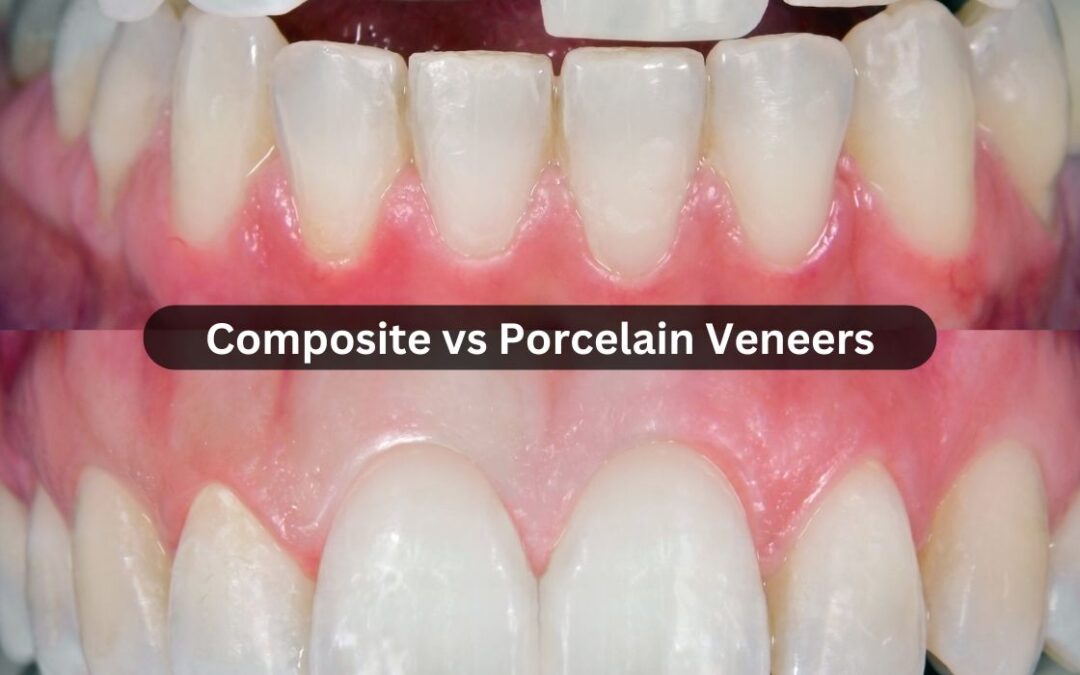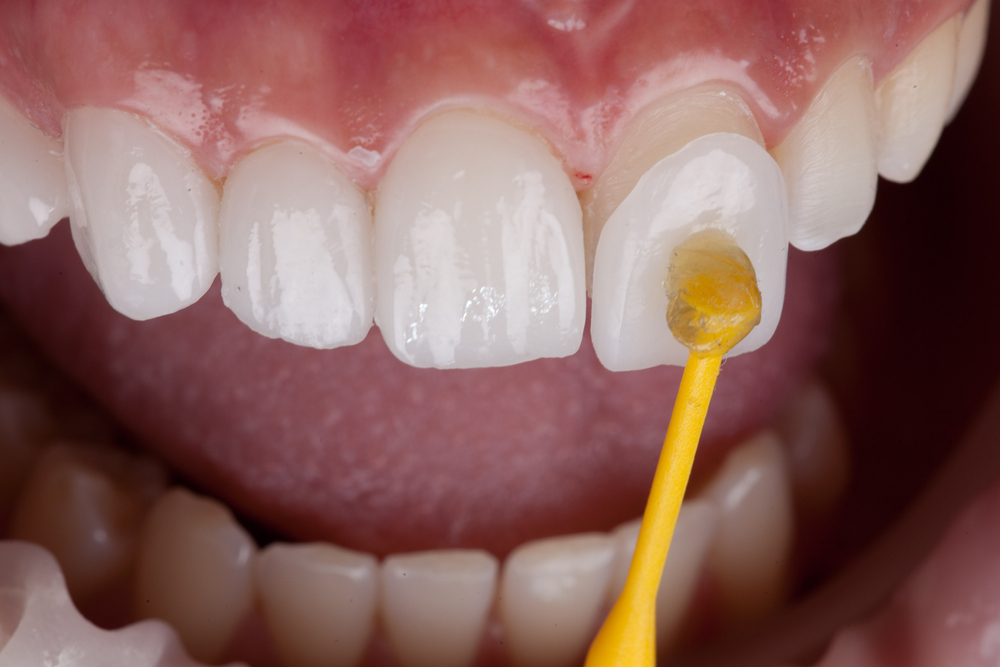Opening the Tricks of Veneers: Truths, Types, and Benefits for a Beautiful Smile
Veneers provide a compelling service for those seeking to improve their smiles. These oral enhancements can resolve numerous blemishes, from staining to misalignment. With options like porcelain and composite, individuals can pick based on their choices and demands. Nonetheless, comprehending the nuances of veneers, consisting of application and treatment, is essential. What factors should one think about before deciding? The responses may amaze those thinking about this aesthetic oral choice.

Recognizing Veneers: What Are They?
Veneers are slim, tailor-made shells made to cover the front surface area of teeth, improving their appearance. Commonly crafted from resilient materials, these coverings are tailored to fit each person's teeth specifically. They serve numerous objectives, including fixing visual flaws such as discoloration, chips, or gaps. The application procedure involves a dental expert preparing the teeth, usually by getting rid of a percentage of enamel to assure a tight fit. As soon as prepared, the veneers are bonded to the teeth making use of a strong adhesive.
Individuals often select veneers for their ability to produce a natural-looking smile while giving a resilient solution to oral flaws. Unlike other cosmetic dentistry choices, veneers require minimal invasive procedures, making them a popular option. The result is an enhanced smile that can considerably boost a person's self-confidence and self-confidence. In general, veneers supply a reliable method to attaining a more unified and eye-catching dental look.
Kinds of Veneers: Porcelain vs. Compound
When taking into consideration cosmetic oral options, two main sorts of veneers stand out: porcelain and composite. Porcelain veneers are crafted from a sturdy ceramic material that resembles the natural appearance of teeth. They are understood for their stain resistance and capability to reflect light similarly to natural enamel, supplying a visual appeal that several clients need. The application procedure typically involves more prep work of the tooth structure and might need several visits to the dental practitioner.
On the various other hand, composite veneers are made from a tooth-colored resin that is straight put on the teeth. This kind allows for quicker application and can commonly be finished in a single see. While they are less costly than porcelain veneers, they might not offer the same long life or resistance to staining. Eventually, the selection between porcelain and composite veneers depends upon individual choices, budget, and details dental requirements.
The Benefits of Picking Veneers
Choosing veneers provides many advantages that can substantially improve both the appearances and capability of an individual's smile. One of the primary benefits is their capacity to fix blemishes such as discoloration, gaps, and imbalance, resulting in a much more uniform look. Veneers can additionally enhance the resilience of teeth, providing a safety layer that shields them from damages.
Furthermore, they call for very little tooth preparation contrasted to various other oral procedures, maintaining even more of the natural tooth structure. This conservation adds to a healthier oral atmosphere while still attaining a spectacular smile.
Veneers are extremely adjustable, enabling people to select the shape, size, and color that best fits their preferences. In addition, they are stain-resistant, making it much easier to maintain a brilliant and attractive smile with time. On the whole, veneers provide a reliable option for those seeking both aesthetic improvement and long-term oral health benefits.
The Veneer Application Process
The veneer application process entails numerous vital steps to assure perfect outcomes. At first, an assessment is performed to analyze the person's needs, followed by the preparation and shaping of the teeth. The veneers are bonded in place, with changes made for a perfect fit and appearance.
First Appointment Tips
A complete first consultation is essential for anybody taking into consideration veneers, as it establishes the structure for an effective treatment. During this meeting, the oral professional reviews the individual's dental health and wellness, going over any existing concerns that could influence the veneer application. This evaluation might include X-rays and an aesthetic examination to figure out the problem of the periodontals and teeth.
The dental professional additionally involves the client in an in-depth conversation about their aesthetic goals, preferences, and assumptions. They might provide various veneer options customized to the patient's specific requirements. Additionally, the professional discusses the treatment, potential threats, and aftercare needs, making certain that the patient is knowledgeable and comfortable prior to continuing with the therapy.
Preparation and Shaping Teeth
After the initial appointment, the next stage involves the preparation and shaping of the teeth to accommodate the veneers. This essential step is executed by the dental professional, that carefully examines the tooth framework to identify the quantity of enamel that needs to be eliminated. Usually, a thin layer, usually around 0.5 millimeters, is slashed off to guarantee a correct suitable for the veneers. Precision is critical during this process, as it impacts both the overall comfort and the visual outcome. When the teeth are properly shaped, perceptions are taken to produce customized veneers that straighten flawlessly with the individual's dental profile. This careful preparation sets the stage for a successful veneer application, improving both look and feature.
Bonding and Last Changes
Adhering to the shaping and preparation of the teeth, the bonding procedure starts, noting an essential stage in the veneer application. During this phase, an oral adhesive is put on the prepared tooth surface area, ensuring a strong bond between the veneer and the tooth. The dental practitioner meticulously places the veneer, making modifications to accomplish the wanted alignment and aesthetic appeals. When effectively positioned, a special light is made use of to treat the adhesive, strengthening the bond. After curing, the dentist carries out final modifications, trimming any type of excess material and refining the veneer's form to ensure an all-natural appearance. This careful focus to information boosts both feature and looks, adding to a general attractive smile that is sturdy and long-lasting.
Taking care of Your Veneers: Upkeep Tips
Caring for veneers is important to keep their appearance and longevity. A consistent daily cleaning routine, conscious evasion of staining foods, and normal dental check-ups are crucial components of reliable maintenance. These techniques aid guarantee that veneers remain in peak condition and remain to boost one's smile.
Daily Cleaning Regimen
On a regular basis maintaining veneers is essential for their durability and look. A correct day-to-day cleansing routine can help protect their luster and protect against damage. Dental professionals suggest brushing twice a day with a soft-bristled tooth brush and fluoride tooth paste, making certain that all surfaces are cleansed carefully to stay clear of scratching the veneer surface area. Flossing daily is likewise crucial to eliminate food particles and plaque from in between teeth, where brushes might not get to. Additionally, making use of an antimicrobial mouth wash can assist maintain oral health without harming the veneers. It review is suggested to avoid unpleasant cleaners and devices that can scratch the veneer. By following these easy actions, people can keep their veneers looking stunning while advertising total dental wellness.
Avoiding Discoloration Foods
Although veneers are created to improve the appearance of teeth, their sensitivity to staining requires careful nutritional options. It is crucial for people with veneers to be mindful of certain foods and drinks that can cause staining. Dark-colored things such as coffee, red a glass of wine, and berry juices need to be eaten in small amounts, as they are known to discolor both all-natural teeth and veneers. In addition, acidic foods like citrus fruits can deteriorate the bonding representatives used in veneers, making them extra prone to discoloration. To keep a brilliant smile, it is recommended to rinse the mouth with water after eating discoloration foods and to practice normal oral hygiene. These thoughtful options contribute substantially to the longevity and looks of veneers.

Routine Dental Examinations

Maintaining the integrity of veneers needs a commitment to routine dental examinations, as these consultations play an essential role in guaranteeing their durability and appearance. Throughout these check outs, oral specialists can evaluate the condition of the veneers, looking for any indications of wear, damages, or underlying dental issues. Furthermore, regular cleansings help get rid of plaque and tartar that can gather around the veneers, advertising total oral health and wellness. Dental experts can also offer tailored advice on treatment strategies and items matched for veneer maintenance. By sticking to a schedule of examinations, individuals can address potential issues early, ensuring their smile remains lively and beautiful. Inevitably, routine oral sees are an essential part of veneer care.
Is Veneers the Right Alternative for You?
Deciding whether veneers are the right alternative typically depends upon individual visual objectives and oral demands. For those seeking to address issues such as staining, chips, or misalignment, veneers can give a transformative option. Prospects usually consist of individuals with healthy and balanced teeth yet want a boosted smile.
It is vital to take into account elements such as tooth enamel problem, the level of oral issues, and the determination to keep veneers. Consulting with an oral expert is necessary, as they can review dental wellness and determine if veneers appropriate
Additionally, possible prospects must review the lasting commitment, as veneers may need substitute every 10-15 years. Cost considerations likewise play a substantial function, as veneers can be a considerable financial investment. Ultimately, the choice must be well-informed, stabilizing aesthetic desires with useful considerations for lasting results.
Often Asked Concerns
The Length Of Time Do Veneers Normally Last Before Requiring Replacement?
Veneers usually last between 10 to 15 years before needing replacement. Aspects such as dental hygiene, way of life choices, and material high quality can affect their longevity, making normal oral check-ups important for keeping their problem.
Are Veneers Safe for People With Sensitive Teeth?
Veneers can be safe for individuals with delicate teeth, yet it typically depends on the extent of sensitivity and the dental professional's strategy. Consulting a dental professional prior to proceeding is vital to ensure suitable end results.
Can Veneers Be Gotten Rid Of or Replaced Conveniently?

Do Veneers Spot Gradually, and Just How Can I Stop It?
Veneers can stain with time, particularly from foods and beverages like coffee or merlot. To stop discoloration, keeping good dental hygiene, making use of a straw for beverages, and normal oral cleansings are suggested methods.
What Is the Price Variety for Obtaining Veneers?
The cost of our website veneers generally ranges from $500 to $2,500 per tooth, relying on variables such as material type, dentist experience, and area. Patients need to seek advice from with dental specialists for personalized quotes and funding choices.
As soon as the teeth are properly formed, impacts are taken to produce custom veneers that straighten completely with the person's oral read this article profile. During this stage, a dental adhesive is used to the prepared tooth surface area, assuring a solid bond in between the veneer and the tooth. It is essential to take into account elements such as tooth enamel problem, the level of dental concerns, and the readiness to maintain veneers. Veneers can be risk-free for individuals with delicate teeth, yet it frequently depends on the extent of level of sensitivity and the dental practitioner's technique. The expense of veneers usually ranges from $500 to $2,500 per tooth, depending on factors such as material kind, dentist experience, and area.